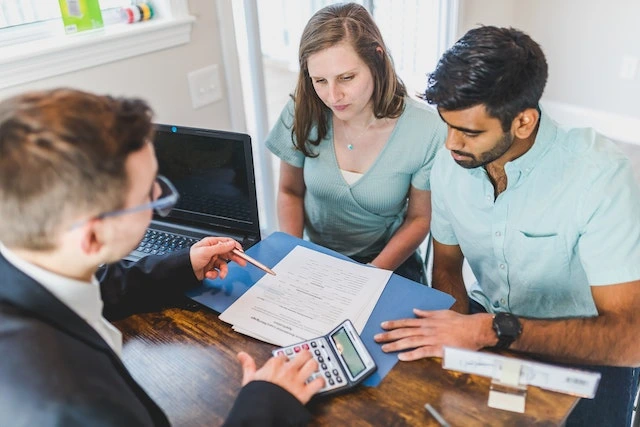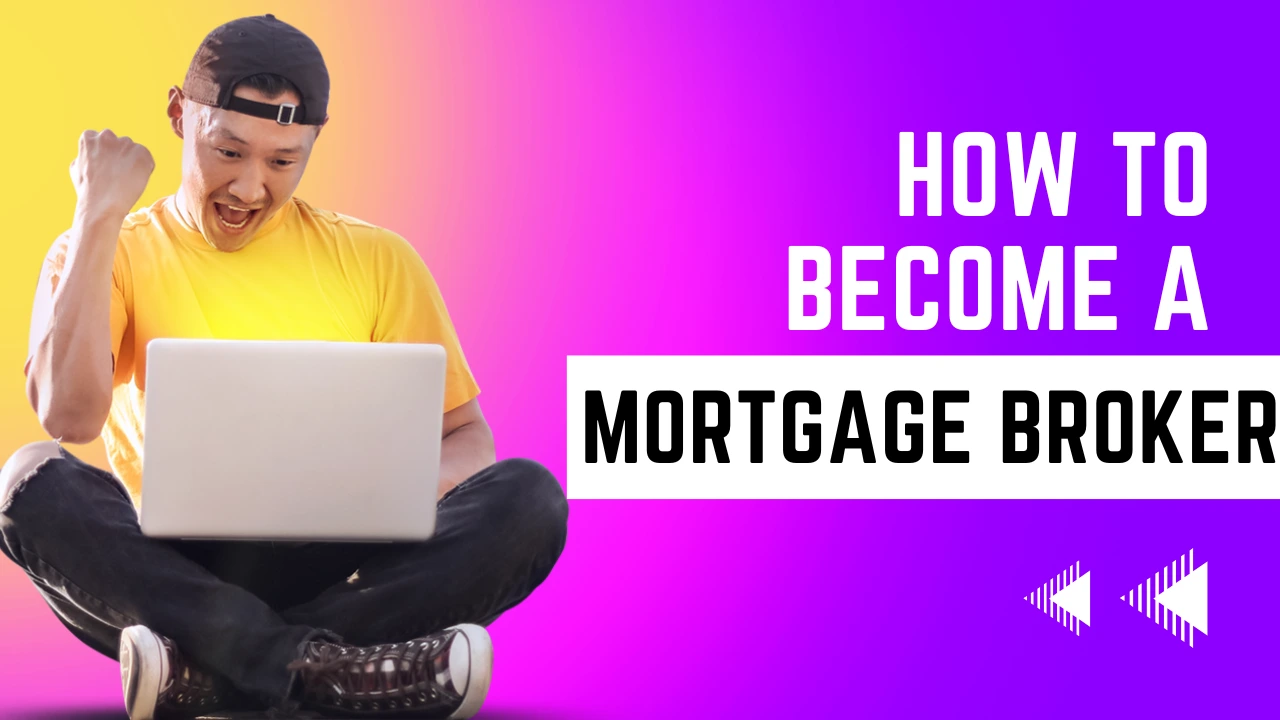How To become a mortgage broker: A mortgage broker is a professional who helps borrowers find and secure home loans from a variety of lenders. They work with borrowers to understand their financial needs and goals, and then help them find a mortgage product that meets those needs.
Mortgage brokers are licensed professionals who are trained to understand the various mortgage products available on the market and to help borrowers find the best product for their needs. They are able to negotiate with lenders on behalf of the borrower and help the borrower understand the terms of the mortgage loan.

Mortgage brokers are typically paid a commission by the lender for bringing in new business. They may also charge the borrower a fee for their services. It is important for borrowers to understand the fees and commissions that mortgage brokers may charge, as well as the terms of any mortgage product they may be considering.
How To become a mortgage broker
- Meet the minimum educational requirements. In most states, mortgage brokers need to have a high school diploma or equivalent and complete at least 20 hours of pre-licensing education. Some states may also require you to have a college degree or take additional courses.
- Obtain a license. In order to legally practice as a mortgage broker, you will need to obtain a license from the state in which you plan to work. To get a license, you will usually need to pass a background check and pass a licensing exam.
- Get experience in the field. While not always required, having experience in the mortgage industry can be helpful when starting out as a mortgage broker. This could include working as a loan officer, underwriter, or in a related field.
- Build your network and establish relationships. As a mortgage broker, a large part of your job will involve working with clients, lenders, and other industry professionals. Building relationships and networking within the industry can help you establish yourself as a trusted and knowledgeable broker.
- Consider obtaining additional certifications or designations. There are several professional certifications and designations that can help you stand out in the industry and demonstrate your expertise, such as the Certified Mortgage Broker (CMB) or the Certified Mortgage Banker (CMB).
It’s important to note that the requirements for becoming a mortgage broker can vary by state, so be sure to check with your state’s regulatory agency for specific requirements.

Minimum Educational Requirements
To meet the minimum educational requirements for becoming a mortgage broker, you will typically need to:
- Have a high school diploma or equivalent. Most states require mortgage brokers to have at least a high school education or equivalent.
- Complete a pre-licensing education course. Many states require mortgage brokers to complete a certain number of hours of pre-licensing education before they can obtain a license. This education typically covers topics such as mortgage laws and regulations, ethics, and industry best practices.
- Consider obtaining a college degree. While not always required, some states may require mortgage brokers to have a college degree or take additional courses beyond the pre-licensing education. A degree in a related field, such as finance or business, can also be helpful for those interested in pursuing a career as a mortgage broker.
It’s important to note that the specific educational requirements for becoming a mortgage broker can vary by state, so be sure to check with your state’s regulatory agency for specific requirements.

Obtain a license
To obtain a license as a mortgage broker, you will typically need to:
- Determine the specific licensing requirements in your state. The requirements for obtaining a mortgage broker license can vary by state, so it’s important to check with your state’s regulatory agency for specific requirements.
- Complete a pre-licensing education course. Most states require mortgage brokers to complete a certain number of hours of pre-licensing education before they can obtain a license. This education typically covers topics such as mortgage laws and regulations, ethics, and industry best practices.
- Pass a background check. Most states require mortgage brokers to undergo a background check as part of the licensing process. This may include a criminal history check, as well as a review of your financial history and any prior disciplinary actions.
- Pass a licensing exam. Most states require mortgage brokers to pass a licensing exam before they can obtain a license. The exam covers topics such as mortgage laws and regulations, ethics, and industry best practices.
- Submit an application and pay any required fees. Once you have completed the necessary education and passed the background check and licensing exam, you will need to submit an application and pay any required fees to obtain your mortgage broker license.
It’s important to note that the specific requirements for obtaining a mortgage broker license can vary by state, so be sure to check with your state’s regulatory agency for specific requirements.

Get experience in the field
There are several ways to gain experience in the mortgage industry:
- Consider working as a loan officer or underwriter. These positions can provide valuable experience and insight into the mortgage industry, as well as help you develop valuable skills such as working with clients and understanding mortgage products and underwriting guidelines.
- Intern or volunteer with a mortgage company. Many mortgage companies offer internships or volunteer opportunities that can provide hands-on experience and help you learn about the industry.
- Join a professional association or network. Participating in professional associations or networking groups can help you connect with other industry professionals and stay up-to-date on industry trends and best practices.
- Consider obtaining additional education or certifications. Pursuing additional education or certifications in the mortgage industry can help you gain a deeper understanding of the field and demonstrate your commitment to your career.
It’s important to note that gaining experience in the mortgage industry can take time and may require some networking and networking. However, the more experience you have, the more competitive you will be as a mortgage broker.
Also Read: Reverse Mortgage Loan Buy Fremont | Fremont Bank Mortgage
Build your network and establish relationships
There are several ways to build your network and establish relationships within the mortgage industry:
- Attend industry events and conferences. Attending industry events and conferences can help you connect with other professionals and learn about the latest trends and best practices in the industry.
- Join a professional association or network. Joining a professional association or networking group can help you connect with other industry professionals and stay up-to-date on industry trends and best practices.
- Participate in community events and organizations. Getting involved in your community can help you make connections and build relationships with local professionals and business owners.
- Utilize social media and online networking platforms. LinkedIn and other social media platforms can be a great way to connect with other industry professionals and stay connected.
- Network with your clients and lenders. Building relationships with your clients and lenders is an important part of being a mortgage broker. Make sure to follow up with clients after you have helped them obtain a mortgage, and stay in touch with lenders to establish yourself as a trusted broker.
Building a network and establishing relationships in the mortgage industry can take time and effort, but it can be an important part of building a successful career as a mortgage broker.

Consider obtaining additional certifications or designations
Obtaining additional certifications or designations can help you stand out in the mortgage industry and demonstrate your expertise:
- Research different certifications or designations. There are several professional certifications and designations available for mortgage brokers, such as the Certified Mortgage Broker (CMB) or the Certified Mortgage Banker (CMB). Research the requirements and benefits of each to determine which may be right for you.
- Meet the requirements for the certification or designation. Each certification or designation will have its own requirements, such as completing a certain number of hours of education or having a certain level of experience in the industry. Make sure you meet the requirements before applying.
- Apply for the certification or designation. Once you have met the requirements, you can apply for the certification or designation through the issuing organization. This may involve submitting an application, paying any fees, and potentially taking an exam.
- Maintain your certification or designation. Many certifications and designations require ongoing education or continuing education units (CEUs) to maintain. Make sure to stay up-to-date with the requirements to keep your certification or designation active.
Obtaining additional certifications or designations can take time and effort, but they can be a valuable addition to your resume and help you stand out in the industry.
